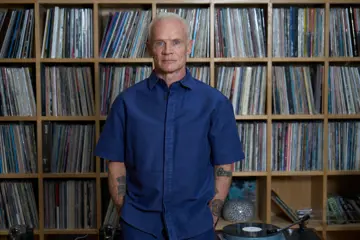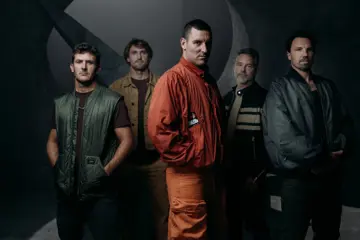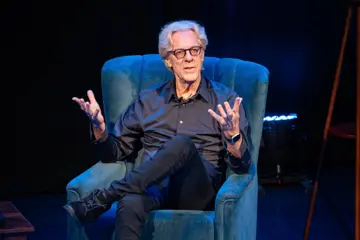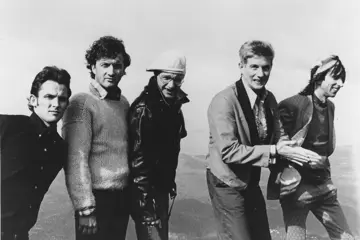It speaks volumes about the cold, cold heart of Michael Haneke – that cinematic master whose career has been one long chronicle of human cruelty – that the world would see Amour as being somehow warm; as if the mere presence of love, in both story and title, somehow represents the great thawing of this most frigid auteur. Which isn't to dismiss the great tide of critical praise that has come its way: Amour is, as usual, meticulously made; a brilliant piece of cinematic formalism in which every frame is carefully composed, every shot is defiantly held, every thought and word and gesture loaded with weight and theme.
Here, though, the themes are undoubtedly different, and, more human. Where he's long looked at the societal – the corrosive influence of media violence (Benny's Video, Funny Games), the spectre of national guilt (Caché, The White Ribbon), the tenuousness of social mores and human compassion (Code Unknown, The Time Of The Wolf) – here he looks at the personal. In a pair of profound performances, Jean-Louis Trintignant and Emmanuelle Riva play an aged husband-and-wife forced to peer into the imminent oblivion of their mortality when Riva suffers a stroke. From there, Haneke touches on universal themes: how to manage suffering? When must the wishes of the dying be respected? Is there ever a 'good way' to bow out? If love is life, can death, too, be an act of love?
The universality of these themes makes Amour Haneke's easiest film to identify with: Trintignant and Riva standing as symbols of old age, and, thus, as our grandparents, or parents, or selves; their imminent demise that which is awaiting all of us. Yet, the fact that it's more human, more personal, more emotional than previous Haneke pictures doesn't change that fact that this is a Haneke picture. It's undoubtedly another chapter in a body-of-work, with countless reminiscent instances – a character named Georges; a flat view of a dining table; the bookshelves of a well-pointed home; piano sonatas; Isabelle Huppert – that connect it to his filmography. Yet, as Hanekean as it is, it's also incredibly reminiscent – be it deliberately or not – of Chantel Akerman's Jeanne Dielman 23, quai du Commerce, 1080 Bruxelles: taking place almost entirely within the walls of the one apartment, within a marriage turned unhappy, with the routines of domesticity growing oppressive, the walls of the flat slowly closing in; the patient, unhurried, unblinking camera forever watching, static, at a hip-height vantage indebted to Ozu.
Amour may be taken as a story of love undying, but the main character of the story is neither husband nor wife, 'til death do they part. Instead, the main character us the very vessel that houses their life together: the apartment itself. Haneke spends two hours essentially surveying the domestic space: his composition endlessly creating frames within frames, and doors upon doors; sometimes these feeling like portals to other rooms, unseen; othertimes feeling like prison walls, condemning our paramours to living their last days incarcerated. Doors become symbolic agents of change: our male lead forever fumbling with locks and handles; when doors are closed, windows open; a pigeon alights through a window, moves through door, and proves elusive, Trintignant must get it back out the window. In another film, a tottering old man trying to corral a clucking bird would be a moment of humour, here it is yet another harbinger: a bird inside a house is a long-held symbol of bad luck, a veritable omen of death.
Don't miss a beat with our FREE daily newsletter
Amour is about life, too: a life lived together, memories shared, time passing, children/students growing older. And, for Haneke, life is cinema; or, at least, indivisible from it. The film's sweetest, most human, in some ways least Hanekean moment comes when Trintignant shares a warm and winsome childhood anecdote, about seeing a film, and recounting its drama to the boy next door. “I don't remember the film, but I remember the feelings,” he says; and you get the sense that here, Haneke is hoping that his own film will, long after its narrative fades away, still arouse those feelings; that long after he, himself, is dead, that his work will be stirring the hearts and touching the lives of viewers. Death is on his mind – this titan of world cinema is now staring at his 71st birthday – and it pervades every frame.
Haneke at his most compassionate is still a cold, unsentimental chronicler of life as a sentient mammal, and of the way the naked ape lives; of human isolation, alienation, loneliness; of life as a form of great suffering, especially in its final moments. Even when suffering is brought to a merciful end, there is still suffering, still that end. And even when a couple dies together – in love, in their apartment, in complete commitment to each other – they still die alone.
The Imposter [sic, obviously] is steeped eyeballs deep in Errol Morris; English debutante Bart Layton – making his first documentary feature after long toiling in unglamorous television (like: Banged Up Abroad, a trashy series dramatically recreating the tales of travelling Brits who were locked up in hellish third-world prisons) – obviously, completely inspired by Morris's approach to documentary cinema. Here, chasing the kind of stranger-than-fiction tale that ends up in the hands of serial newspaper clippers, Layton recounts the story of Frédéric Bourdin, a serial huckster who, after an unhappy childhood bouncing between boys homes and foster families, started adopting the identities of teenage runaways, well into his 20s. It's a Morrisesque story – reminiscent, in places, of One In A Million Trillion, the episode of First Person chronicling 'professional high-school student' Rick Rosner – given the Morrisesque treatment: a narrative-documentary presentation built on to-camera testimonies, dramatic recreations, and illustrative imagery sourced from old newsreels and TV shows, with music used in a very pointed, pushy kind of way. This approach has clearly served as a blueprint for Layton to tell a rippin' yarn, and, o, how does The Imposter rip.
In 1997, Bourdin was in a Spanish halfway house, playing the role of a damaged runaway, desperate to keep the roof over his head. So, he claimed the identity of Nicholas Barclay, an American kid who'd disappeared three years earlier. The ruse seemed ridiculous: Bourdin was older, darker, with a pronounced gap between his teeth; no one's vision of a doppelganger; and, oh, also very, very French. There was no way he could get away with it. And, yet, like some real-life George Costanza, Bourdin threw himself into the lie, tried to believe it as truth, and promised to take it as far as it could go, no matter how freaky it got. And it got freaky like this: upon being 'reunited' with their long lost brother/son, the family of Nicholas (or, indeed, 'Nicholas') didn't push this impostor away in disgust, but pulled him to their chests; willing themselves to join in on this fantasy, no matter how much it defied reality.
Much of what drives the drama of The Imposter – the unanswerable mystery that strings viewers along – is the question of why. Why did the Barclays go along with this? Wishful thinking? A balm for their trauma? A collective delusion? Or did they have something to hide; and, thus, everything to gain from the search for Nicholas being finally put to rest? Unlike West Of Memphis (Amy J. Berg's West Memphis Three documentary we typed about last week), which all but solves the case and leaves viewers in no doubt about the fate of its slain children), The Imposter revels in its mystery. The film is no straight documentary; Bourdin involved both in the to-camera confessions and the dramatic recreations; the picture playing far closer to a dramatic narrative than a piece of classic documentary observation. Really, it functions mostly as a Hitchcockian thriller, full of twists and turns, but with an ambiguous ending that leaves the mystery hanging, lingering in the minds of viewers.
The title of Roman Polanski: A Film Memoir is slightly misleading; this isn't the life of the great Polish director as viewed through his films, but just the story of his life. He sits down with Andrew Braunsberg, a longtime friend and producer, for a conversation about his life. Where Marina Zenovich's impressive 2008 portrait Roman Polanski: Wanted And Desired, made its third-party status its key thematic turn – becoming a study in his controversial court case and its attendant media hysteria; his absence making its abundant hearsay the film's very theme – this Film Memoir comes entirely from the horse's mouth. And it was filmed at a particularly potent time: Polanski talking whilst under house arrest in 2010, in Switzerland awaiting possible extradition to America.
Braunsberg may be Polanski's friend, but he doesn't dodge the difficult subjects: Polanski's childhood as a Jew in occupied Poland; the murder of his pregnant wife, Sharon Tate, by the Manson Family; his arrest for unlawful sexual intercourse with a minor in 1977; and his subsequent re-arrest, over three decades later, when due to accept a lifetime achievement award at the Zürich Film Festival. It's a life of, as Polanski puts it, “great amplitude”; the high peaks and guttural troughs of a wild waveform; triumph and tragedy on-beat and off-beat, his life a dramatic song of dynamic range. The tragedy is, in many ways, the film's metier; Alexandre Desplat's tinkly piano score – which doesn't not possess such great amplitude – giving everything a mournful air of elegant melancholy. The most 'quoted' of Polanski's pictures, herein, is The Pianist; no surprise given it's his most autobiographical, but telling in that this film is casting Polanski as the hero of his own narrative; the resistant artist who has clawed his way through loss that would fell lesser men. Polanski is, often, the victim; not by a fraudulent telling, but by the horror of unfortunate coincidence; the childhood loss of his mother and loss of Tate both due to quirks of circumstance; it hard for Polanski not be victimised against forces of evil as vast as the Third Reich or as daft as the Manson Family.
Making Polanski an empathetic figure – or, one, even, of pity – will surely dismay viewers of certain moral zealotry; those who view Polanski as more of a symbol than a human; a manifestation of taken-sides in a debate, he the figure through which we can discuss the eternal topic of whether an artist's work can/should be viewed through the prism of their own personal indiscretions. Yet, given he's spent decades undergoing an ad-hoc trial-by-media, it's far more telling to hear Polanski speak on his own behalf; and to hear his victim, Samantha Geimer, speak years-on about how the paparazzi have been a far more destructive force in her life than Polanski.
Yet, there's something about the way the film is presented – the softly-lensed shot-reverse-to-infinity; the respectful nodding of Braunsberg; the incessant tasteful tinkling on ivories; the telling lingering on tragedy; the movie clips and newsreel grabs – that makes it feel like some micro-managed, PR-groomed, Barbara Walters/Oprah style sitdown. Braunsberg – and director Laurent Bouzereau – may have had all the access in the world, but Roman Polanski: A Film Memoir feels pat in its pleasant biography, whereas Roman Polanski: Wanted And Desired, made minus its subject's involvement, felt utterly vital and loaded with explosive themes.















